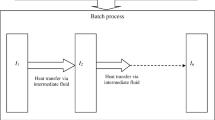Abstract
In the heat integration problem for batch processes, there are two differences in treatment from continuous operations. The first is the occurrence of cocurrent heat exchange, this case may happen when a process can not be transferred to another process. The second is that time must be considered as a variable. We divide the problem into two cases, namely co-current heat exchange and counter-current one, and then intend to find the rules to satisfy the requirement of each case. For the former, a matching rule and a MILP formulation had been proposed but any method did not obtain the optimal solution. The latter including the time as a variable often occurs in the practical industry. The limitation of time has been reduced by changing the schedule of processing or using the heat storages. However, the systematic rule considering the batch cycle time has not been presented for the rescheduling and heat storage is not usually practical although it is reasonable concept. Therefore this paper presents general method for optimal rescheduling to maximize heat recovery and reduce batch cycle time when heat exchanges occur as counter-current type. In the exchanges of co-current type, the heuristic, called the modified H/H which can be used to find the optimal match sequence of heat exchange between hot and cold tanks, is proposed. The proposed heuristics have the advantages of simple calculation and small computation time.
Similar content being viewed by others
Abbreviations
- ΔTmin :
-
minimum allowable temperature approach
- Tinitial :
-
initial temperature of tank
- Tdesind :
-
target temperature of tank
- Tc :
-
temperature of cold tank
- Tci :
-
initial temperature of cold tank
- T fc :
-
final temperature of cold tank
- Tcj :
-
temperature of the j-th cold tank
- Tcjint :
-
initial temperature of the j-th cold tank
- T tcj :
-
target temperature of the j-th cold tank
- Th :
-
temperature hot tank
- T ih :
-
initial temperature of hot tank
- T fh :
-
final temperature of hot tank
- Thi :
-
temperature of the i-th hot tank
- T inthi :
-
initial temperature of the i-th hot tank
- T thi :
-
target temperature of the i-th hot tank
- Qheaimg :
-
summation of heating requirements for cold tanks
- Qrooling :
-
summation of cooling requirements for hot tanks
- VCp :
-
heat capacity flow rate
- VCp,cj :
-
heat capacity flow rate of the j-th cold tank
- VCp,hi :
-
heat capacity flow rate of the i-th hot tank
- TAM:
-
time average model
- TSM:
-
time slice model
- MER:
-
maximum energy recovery
- BCT:
-
batch cycle time
References
Vaselenak, J. A., Grossmann, I. E. and Westerberg, A. W.:Ind. Eng. Chem. Process Des. Dev.,25, 357 (1986).
Obeng, E. D. A. and Ashton, G.J.:Chem. Eng. Res. Des.,66(3), 255 (1988).
Kemp, I. C. and Macdonald, E. K.:IChemE Sym. Ser.,109, 239 (1988).
Kemp, I. C. and Deakin, A. W.:Chem. Eng. Res. Dev.,67, 495 (1989).
Author information
Authors and Affiliations
Rights and permissions
About this article
Cite this article
Jung, SH., Lee, IB., Yang, D.R. et al. Synthesis of maximum energy recovery networks in batch processes. Korean J. Chem. Eng. 11, 162–171 (1994). https://doi.org/10.1007/BF02697461
Received:
Accepted:
Issue Date:
DOI: https://doi.org/10.1007/BF02697461




